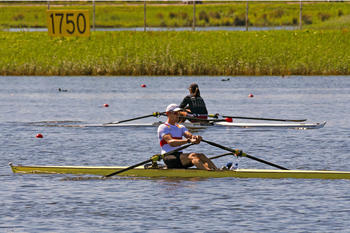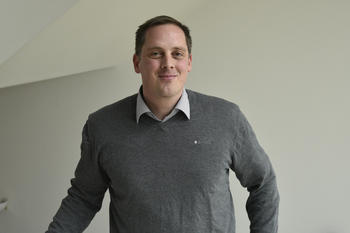University Students and Olympians
Several top athletes are students at Freie Universität; professors act as mentors, helping them to better balance the demands of their studies and competitive sports.
Nov 25, 2016
Rower Johannes Lotz is studying psychology at Freie Universität.
Image Credit: Lotz
Christian Mundhenk is the head of the University Sports Center.
Image Credit: Marina Kosmalla
When competitive athletes are also students at the same time, they are often faced with a balancing act: Attendance obligations and test dates need to be coordinated and juggled with training camps and competitions. But because the Olympics and world championships are not geared toward the rules of study programs, nor are test dates scheduled around sporting events, the situation frequently requires compromise.
These students ultimately rely on their instructors’ goodwill in making special arrangements. To be able to support athletes even better in balancing their activities, Freie Universität has designated five professors to act as mentors.
If problems with coordinating study obligations and competitive sports arise, Christian Mundhenk, head of the University Sports Center, intercedes as the first step. If he does not manage to bring about a solution, the mentor professors will take action, urging their colleagues to show greater understanding for the students’ situations. The following have been designated for this role: Gudrun Doll-Trepper and Harm Kuper of the Department of Education and Psychology, Doris Kolesch and Gunter Gebauer of the Department of Philosophy and Humanities, and Maria Kristina Parr of the Department of Biology, Chemistry and Pharmacy.
The idea behind this is that professors may have an easier time communicating with other professors. “They can raise awareness of this topic again in a different way, and they may be able to find a solution among colleagues,” Mundhenk says. In many cases, the issue revolves around finding a substitute examination for a written test or postponing submission deadlines. “This isn’t about giving anything to competitive athletes for free, though. The only goal is to ensure a certain flexibility in scheduling,” he explains, adding that this flexibility is needed based on the students’ athletic commitments.
A University That Supports Competitive Sports
Scheduling conflicts can arise not only in the case of major competitions, but also with day-to-day training. “Many competitive athletes train twice a day, and they have to fit that in with their class schedules somehow,” Mundhenk says. In many modules, students have long had a choice of various courses, but because competitive sports require a substantial time commitment, these athletes need spots in a special course in many cases. It is not usually possible to select alternatives or variants in choosing a module.
Freie Universität signed an agreement with Olympiastützpunkt Berlin, the German Olympic training center, in 2007 and was officially named a higher education institution for competitive sports (“Hochschule des Spitzensports”) by the German Olympic Sports Confederation (DOSB) in 2011. The university is also a member of an alliance of higher education institutions in Berlin that aims to support competitive sports. Current student athletes at Freie Universität include two handball players on the Füchse Berlin team, a number of hockey players in the German major hockey league, rowers, and judoka, and swimmer Yannick Lebherz. The highest-profile freshman this winter semester is Christoph Harting. Fresh from winning a gold medal in the discus throw at the 2016 Rio Olympics, Harting has enrolled in a program in psychology at Freie Universität.


